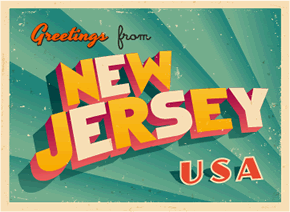5 Thoughts Regarding New Jersey’s Entry into Skill Based Gaming
Contents
Apparently, the NJ Division of Gaming Enforcement is going ahead with a plan to introduce skill-based gaming. More specifically, it is currently accepting applications for skill-based games, with the promise that approved games could be “put on the casino floor within 14 days.”
For more on the particulars, read the full statement from DGE Director David Rebuck here.
To summarize, New Jersey has reaffirmed its commitment to reshaping the Garden State’s struggling gaming arena through the introduction of real-money variations of popular social games and other games that require a measure of skill such as Candy Crush and Words With Friends.
Evolution my dear Watson, evolution.
Should all going according to plan, New Jersey would pioneer a new age of regulated gaming, one based upon the spirit of competition, and more importantly, one amenable to those who presently scoff at casinos because of the house edge.
What follows is five initial thoughts / predictions regarding the implications the DGE’s release has on the future of Atlantic City, gaming in general and how it redefines the gambling demographic.
Player vs. House: Not going to happen
Casinos aren’t in the business of hemorrhaging money. Therefore, I find it inconceivable that land-based casinos will offer player vs. house skill games where the very best players can beat the house on a consistent basis.
Instead, expect casinos to offer skill-based games that fundamentally resemble poker; i.e. games that pit players against one another, where the house is indifferent and takes a predetermined cut of the action, and that involve at least an element of luck.
The last point is of paramount importance. Without at least some measure of luck, better players will always defeat their lesser opponents, and that’s not good for business.
Suffice it to say, chess and checkers won’t be making their way to the casino floor anytime soon. In their stead, expect to see games that rely on random number generators, such as the aforementioned Candy Crush and Words With Friends, perhaps Wheel of Fortune and card-based skill games similar to poker.
Atlantic City revitalized, for at least a time
Atlantic City is about to enter a transitional period; one arguably as monumental as when gambling was first legalized in the Garden State back in 1976.
Phase one of that transition, otherwise known as Trim the Fat, is already in progress. Here’s hoping that the elimination of up to 5 out of 12 AC casinos (at least until the Revel reopens) is enough to stabilize the city’s increasingly fragile economy. If not, expect future casualties.
Phase two involves the integration of a multitude of different game types onto the casino floor. Everything from fantasy sports, to sports betting, poker, traditional table games and social / skill-based games will have their place inside an Atlantic City casino.
With integration comes appeal to new demographics, primarily those interested in sports as well as individuals who have fine-tuned their social gaming skills and now feel compelled to try their hand in a real-money environment. While some of these types were already casino patrons, the average social gaming aficionado and sports wagerer is not necessarily a slot junket.
And thus, in three simple steps, fledgling Atlantic City is reborn. But before casinos start serving lemonade and party cake, they should be warned that the party might not last.
Atlantic City has proven all too suspect to the ills of cannibalization. And just because it’s managed to stay ahead of the proverbial gambling curve on this one occasion, certainly does not mean it will stay cutting edge.
Other states will catch up, and in some instances will do skill-based gaming better than New Jersey. Right now, neighboring Pennsylvania – one of a few states responsible for systematically ravishing AC’s economy – is the biggest threat, if only because it’s the closest to regulating online gambling.
From this point forward, it’s the Garden State’s job to somehow keep a one up on its competitors. Otherwise, this painful cycle of prosperity followed by destitution will repeat itself until the city can no longer sustain.
Skill based gaming goes online
Social and skill-based gaming succeeds because of its convenient and incremental nature. A player in New Jersey can link up with his buddy out in California and play a game of Words With Friends at a moment’s notice. Sometimes he plays for fun, others to earn achievements or level up.
Real-money skill-based gaming via computers and mobile devices is merely a natural extension of this already proven and widely successful format.
New Jersey is one of the few states that has the means to approve real-money online games in swift fashion. And it looks like the DGE will be wasting no time getting the ball rolling on integrating skill-based games into the state’s nascent iGaming industry.
Although there was no mention of online gambling in the DGE statement, a spokesman from the agency confirmed to Online Poker Report’s Chris Grove that the DGE is accepting applications for online games.
This bodes well for the future of the state’s until now underwhelming Internet gaming roll out, especially since skill-based gaming, by nature, is more conducive for play over the Internet than in land-based casinos.
There’s a segment of the gaming population that frowns upon the current social gaming model, particularly those games that all but force players to make monetary purchases to proceed, with no inkling of a monetary reward in return.
Real-money skill-based gaming has the potential to nip this problem in the bud (emphasis on potential).
To illustrate:
Right now, it’s in the social gaming operator’s best interest to feed players just enough free rope to goad them into making micro-transactions. But for real-money skill-game operators the money is in pitting skilled players against one another, not in taking measures that can stunt their development.
In order to facilitate player growth, the operator’s strategy should be to offer completely free access to the gaming world. This goes against just about every financial rule obeyed by the social gaming industry, but it will work.
Liken it to the poker boom. Before 2003, online poker sites were scarce, as was poker-focused subject matter. In turn, players had no means of enhancing their skills outside of getting their asses handed to them on the green felt – not exactly the most appealing educational device.
Fast forward a few years later and the Internet is suddenly littered with poker materials. Everything from training sites to strategy forums and free-to-play social poker rooms are available at the click of a mouse.
As a result, the average Joe with a desire to learn can grasp the game of poker without investing a dime.
Subsequently, poker became more popular.
If skill-gaming operators offer players free and unbiased access to their products, it will enable them to compete at a high level, which is exactly what operators will need to generate sustainable income.
New Jersey: The next tech epicenter
Envision this scenario:
Seasoned software developers and start-ups alike set up shop in New Jersey (presumably in and around Atlantic City) with the intention of cashing in on the new real-money skill-based gaming industry.
Atlantic City gains a unique opportunity to grow one of its non-gaming sectors; something it desperately needs to do to alleviate its reliance on gambling as a source of revenue.
New Jersey becomes a center of technological innovation, akin to Silicon Valley in the late-1990’s. Atlantic City’s economy booms, New Jersey becomes an intentional iGaming hub, and Senator Lesniak’s vision of a re-imagined gaming industry is fulfilled.
Given the popularity of social gaming in the United States, juxtaposed with the allure of attainable wealth, it is really that inconceivable?
To quote Bob Dylan, “The times, they are a changin’.” Should skill-based gaming take off, and I gander it will, the times will also be a rousing.






